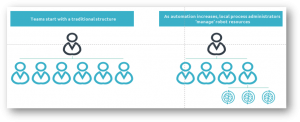This question emerged during the Digital Leaders Salon event last week where Adrian Leer, our MD at Triad Group Plc, presented the findings of our 2020 tech trends survey. The context around it was the ever-increasing use of technology in the workplace, in particular white-collar automation and the move to low-touch business processes.
The participants led by Sarah Burnett, EVP at the Everest Group, discussed how, as automation in business processes increases and human involvement correspondingly decreases, we may well arrive, if we don’t plan ahead, at a situation where organisations struggle to react to changes in process. Or, that the support mechanisms for automated processes are so structured that they leave little room for adaptation – meaning that these processes rapidly become obsolete.
Since I joined Triad to lead the Intelligent Automation practice, we’ve also identified this challenge and developed a dual approach. We know that automation represents significant opportunities and benefits for many businesses. However, the migration must be done in a sustainable and flexible way that allows businesses to adapt to changing situations and market conditions in both the near and long term
Firstly, it’s about people, as automation increasingly replaces human interaction with the data flowing through these processes the role of staff will change, and this must be thought through ahead of going into any automation initiative. This consideration applies elsewhere, but here the focus is on one crucial element; upskilling process ‘doers’ into process ‘administrators’. By this, we mean ensuring that, as part of the development process and through deliberate training, some of your Subject Matter Experts (SMEs) gain an understanding of how to work in the RPA technology you choose.
These technologies are, after all, designed to be low-code, and suitable for use by non-technical business staff. Here, we mean simply the ability to perform basic break/fix actions and ‘keep the lights on’ by handling some of the exceptions that will be thrown up by an active process. In this way, some staff can learn new skills and move into more rewarding positions within their current teams as part of the process of implementing automation. The company also keeps people who know the process involved in its management.

Secondly, it’s about how we design support and maintenance organisations for automation and the roles that are performed in that function. Context varies, but Triad would typically recommend having rudimental support done by people who are familiar with the process and situated within the department that owns the outcome, as demonstrated above in the form of process administrators.
But for many companies, particularly the (relatively) smaller ones, for whom automation is rapidly becoming more affordable and accessible, it may not make financial sense to build a large internal capability to manage their automations. As such, outsourcing may appeal as a possible solution.
This can, however, also present a problem; many traditional outsourcing contracts have very limited flexibility and therefore are not very adaptable to change, while business processes have to be adaptable to changing customer desires and marketplace shifts. As such, when organising this type of work, we advise companies to ensure their contracts take into account both their current needs and their expectations for change.
The solution to both parts of the ‘who fixes the robots?’ approach comes back to adoption. Often the term ‘adoption’ is taken to mean the end-users adapting to the new technology with which they find themselves working, but the solution here is about senior leaders in industry and outsourcing accepting that their businesses will change as a result of the spread of novel technologies and adapting their business models to take advantage of that.
Planning for the future evolution of processes and therefore the ‘fixing’ of robots to reflect those changes needs building into the automation programme from the start.
Joe Wheatley, Practice lead, Automation and AI, Triad Group Plc
A results-focused leader in the consulting space around automation and AI, with a range of project and programme delivery management experience across the banking, insurance, infrastructure, technology, outsourcing, recruitment and FMCG sectors in the UK, EU and USA.


